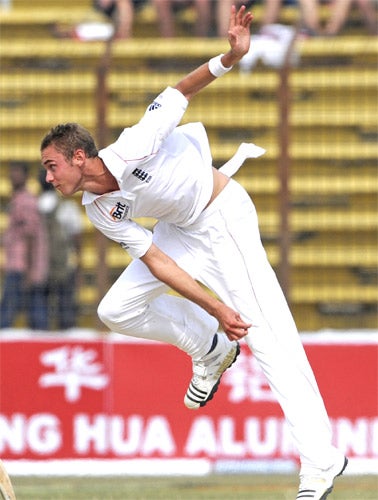Broad into reverse after his apology
The paceman knows he must swing the ball to avoid the frustration that led to his first Test misbehaviour, writes Stephen Brenkley

This England team leave nothing to chance. They practise hard, prepare devoutly and yesterday they got their just reward for such endeavour when they appeared to move to No 1 in the world apology rankings.
Following hard on Graeme Swann's solemn declaration the previous day that he "apologised unreservedly" for a misdemeanour on the field, Stuart Broad all but matched him for contrition yesterday when he said that he had already acknowledged his infraction in the first Test against Bangladesh.
While it would be an exaggeration to say that there was not a dry eye round the Dhaka pool as Broad confessed his sin, it was still pretty impressive stuff. Cricket is hardly full of Australians who mess up one day and then search their souls the next, but England sensed they had little wriggle room. Why, it might also allow them a next time.
Broad was the second of England's bowlers to be caught in the moment on the fifth day of the match in Chittagong on Tuesday when the home side demonstrated rather more fight than England had bargained for. First, Swann, on breaking the partnership which caused all the trouble, swore at the departing batsman, Junaid Siddique and raised his finger to indicate that he was indeed out.
Not long after, Broad bowled a ball of full length from round the wicket to Abdur Razzaq. It looked a convincing lbw shout but Broad did not observe the protocol, nay the regulation of appealing, instead dashing down the wicket to celebrate. It was an outpouring of relief but it was still an unbecoming transgression.
"I got a bit carried away there," Broad said. "I said sorry to Rod the umpire straightaway and he accepted my apology. He's a good fellow. He knew it had been a tough, frustrating morning and as soon as I did it I apologised and he said no worries at all."
The Rod in question was Rod Tucker, an Australian standing in only his second Test match, with whom England have become familiar this winter since he has stood in all their one-day internationals in South Africa and Bangladesh. He might have seen nothing wrong in Broad's behaviour, which was not only slightly disrespectful to the batsman but it did not meet with the requirements of law 27, the first part of which is headed "Umpire not to give batsman out without an appeal." So strictly speaking, if Broad did not bother to appeal, Tucker's finger should have remained in his pocket.
"It wasn't anything offensive," Broad said. "I've not seen it, that's for you to judge. The match referee has not come to me so it's not an issue for me, the team or the umpires. I can't think I have been in trouble for that in the past."
Not perhaps as well-upholstered as that of Swann, but then Swann is also now the No 2 bowler in the world rankings, while Broad stands at 11th, which is possibly the gap that may be perceived in the quality of their apology: Swann made it to the world, Broad to a mere umpire.
England were feeling pretty pleased with themselves about the outcome of a match in which they had to work harder than they must have expected after two days. Bangladesh repelled them for 744 balls in the second innings.
Broad spoke persuasively about the importance of reverse swing on such flat wickets. But the game cannot hope to prosper on such surfaces and, although Bangladesh's batsmen are more competent than their bowlers, the probability is that the only way to produce a result in Chittagong between any other two countries would have been to play a timeless match.
"I have got better bowling on flat wickets, especially to the left-handers bowling over and round the wicket, trying to vary the angle," he said. "But if you look at the best subcontinent bowlers like Zaheer Khan, he just looks to reverse swing and cleans up tails for fun. That's something all the English bowlers have been working on very hard since the Caribbean last year because we realise if you don't get reverse swing and you're not good enough to be dangerous you're not going to get wickets on pitches like that."
Dead pitches have a lot to answer for. People get hot under the collar and then end up having to ask forgiveness. But Tests at their best should mean never having to say you're sorry.
Join our commenting forum
Join thought-provoking conversations, follow other Independent readers and see their replies
Comments